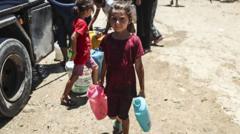Will Israel Relocate Gaza's Population to Rafah Camps?

Understanding the Current Situation in Gaza: A Complex Humanitarian Crisis
The ongoing conflict in Gaza has escalated into a humanitarian crisis of unprecedented proportions. With Israeli Defence Minister Israel Katz's recent statements indicating a plan to relocate the Palestinian population of Gaza into a designated area, concerns about the consequences of such actions have reached a fever pitch. This article delves deep into the implications of these developments, the historical context surrounding them, and their potential impact on the Palestinian people, as well as international law and humanitarian responses.
Recent Statements and Plans
Israel Katz's proposal to establish a "humanitarian city" in the southern part of Gaza, specifically on the ruins of Rafah, has raised alarms among human rights advocates and international observers. The intent to transfer approximately 600,000 Palestinians initially, with plans to eventually relocate the entire population of 2.1 million, has been met with vehement opposition. Katz's remarks about conducting security screenings to exclude Hamas operatives emphasize the Israeli government's focus on security over humanitarian considerations.
The Human Rights Perspective
Michael Sfard, an Israeli human rights lawyer, condemned the proposed plan, labeling it an "operational plan for a crime against humanity." This perspective aligns with the United Nations' stance that the forcible transfer of civilians from occupied territories constitutes a grave violation of international humanitarian law. The implications of such a population transfer are profound, not only for the individuals involved but also for the broader geopolitical landscape.
The Historical Context of Displacement
To fully understand the ramifications of the current situation, one must consider the historical context. The Nakba, or "catastrophe," refers to the events of 1948 when hundreds of thousands of Palestinians were displaced from their homes during the establishment of the State of Israel. This historical trauma continues to influence Palestinian identity and collective memory, making any contemporary discussions of displacement particularly sensitive.
Demographics and Refugee Crisis
Today, the demographic composition of Gaza is largely affected by historical displacements. Approximately 75% of Gaza's population consists of refugees or descendants of refugees from the Nakba. Additionally, around 900,000 registered refugees reside in the occupied West Bank, while millions more live in neighboring countries such as Jordan, Syria, and Lebanon. The ongoing conflict has only exacerbated this humanitarian crisis, with millions of Palestinians facing uncertainty and instability.
The Impact of Military Operations
The recent escalation of military operations in Gaza has had devastating consequences. Following the cross-border attack on October 7, 2023, which resulted in significant casualties and hostages taken, Israel launched a campaign aimed at dismantling Hamas. Reports indicate that over 57,500 individuals have been killed in Gaza since the onset of this military campaign, according to the health ministry governed by Hamas.
Infrastructure and Humanitarian Conditions
The destruction wrought by the conflict has severely impacted Gaza's infrastructure. Key services including healthcare, water, sanitation, and hygiene systems have collapsed, leading to dire living conditions. With more than 90% of homes damaged or destroyed, residents face acute shortages of basic necessities such as food, fuel, medicine, and shelter. The humanitarian situation is characterized by:
- Widespread displacement of the population
- Severe damage to healthcare facilities
- Collapse of essential services like water and sanitation
- Increasing levels of food insecurity
International Reactions and Proposals
The international community's response to the situation has varied, with differing perspectives on how to address the crisis. Recent discussions have included proposals from various stakeholders, including the United States. Israeli Prime Minister Benjamin Netanyahu's comments regarding President Trump's vision for post-war Gaza hinted at a potential resettlement plan that raises concerns about the rights and choices of the Palestinian population.
Regional Perspectives and Alternatives
In March, Arab states presented a $53 billion proposal that emphasized the importance of allowing Palestinians to remain in their homes rather than being forcibly displaced. This Egyptian alternative to Trump's plan received backing from both the Palestinian Authority and Hamas, highlighting a regional consensus against displacement. The proposal aimed to provide a framework for Gaza's reconstruction while respecting the rights of its residents.
Concerns Over Ethnic Cleansing
The potential for a large-scale population transfer has evoked fears of ethnic cleansing among Palestinians and their advocates. The historical legacy of the Nakba looms large, making any suggestion of forced displacement highly contentious. International law explicitly prohibits the deportation of civilian populations from occupied territories, labeling such actions as crimes against humanity.
The Role of International Humanitarian Law
International humanitarian law, which governs the conduct of armed conflict and seeks to protect individuals during times of war, explicitly forbids actions such as forced displacement. The principle of distinction, which obligates parties in a conflict to differentiate between combatants and non-combatants, is critical in this context. Violations of these principles can lead to significant legal consequences for those responsible.
Humanitarian Aid and Response Efforts
The humanitarian response to the crisis in Gaza has been hampered by ongoing violence and access restrictions. Humanitarian organizations face numerous challenges in delivering aid, including security risks, logistical hurdles, and the sheer scale of need. As the situation continues to deteriorate, international aid organizations emphasize the urgent need for:
- Increased funding for humanitarian efforts
- Access to affected populations
- Long-term solutions for reconstruction and recovery
The Importance of Civilian Protection
Protecting civilians in conflict zones is a fundamental obligation under international law. As the situation in Gaza evolves, there is a pressing need for all parties involved to prioritize the safety and well-being of non-combatants. Diplomatic efforts should focus on establishing ceasefires and facilitating humanitarian access to ensure that the needs of the civilian population are met.
Looking Ahead: The Path to Peace
The current situation in Gaza presents a complex and multifaceted crisis that requires comprehensive solutions. Addressing the immediate humanitarian needs of the population must go hand in hand with long-term political solutions that respect the rights and aspirations of the Palestinian people. The international community must play an active role in promoting dialogue and reconciliation, as well as advocating for adherence to international law.
Potential Paths to Resolution
Several potential paths could lead to a resolution of the crisis, including:
- Engaging in meaningful negotiations that involve all stakeholders, including Palestinian representatives.
- Implementing international monitoring mechanisms to ensure compliance with humanitarian law.
- Prioritizing economic development and reconstruction efforts in Gaza to foster stability.
Conclusion: A Call for Action
The situation in Gaza is a stark reminder of the ongoing humanitarian crises that persist around the world. As discussions about population transfer and the future of the Palestinian people unfold, it is imperative for the international community to advocate for solutions that prioritize human rights, dignity, and protection for all civilians. The road ahead is fraught with challenges, but with concerted efforts and a commitment to justice, it is possible to work towards a more peaceful and equitable future in the region.
FAQs
What is the proposed plan to relocate Palestinians in Gaza?
The proposed plan involves moving Palestinians to a "humanitarian city" in southern Gaza, initially aiming to house around 600,000 people and potentially the entire population of 2.1 million.
What are the human rights implications of this plan?
The plan has been condemned as a potential crime against humanity and a violation of international humanitarian law, as it involves the forcible transfer of civilians from their homes.
How has the international community responded to the crisis in Gaza?
The international community has expressed concern over the humanitarian situation, with varying proposals on how to address the crisis, including alternatives to displacement that respect the rights of Palestinians.
The situation in Gaza remains dire and complex, requiring urgent attention and action from both local and international entities. How will the world respond to the pressing needs of the Palestinian people amidst this unfolding tragedy? #GazaCrisis #HumanRights #PeaceInTheMiddleEast
Published: 2025-07-08 10:39:04 | Category: world



